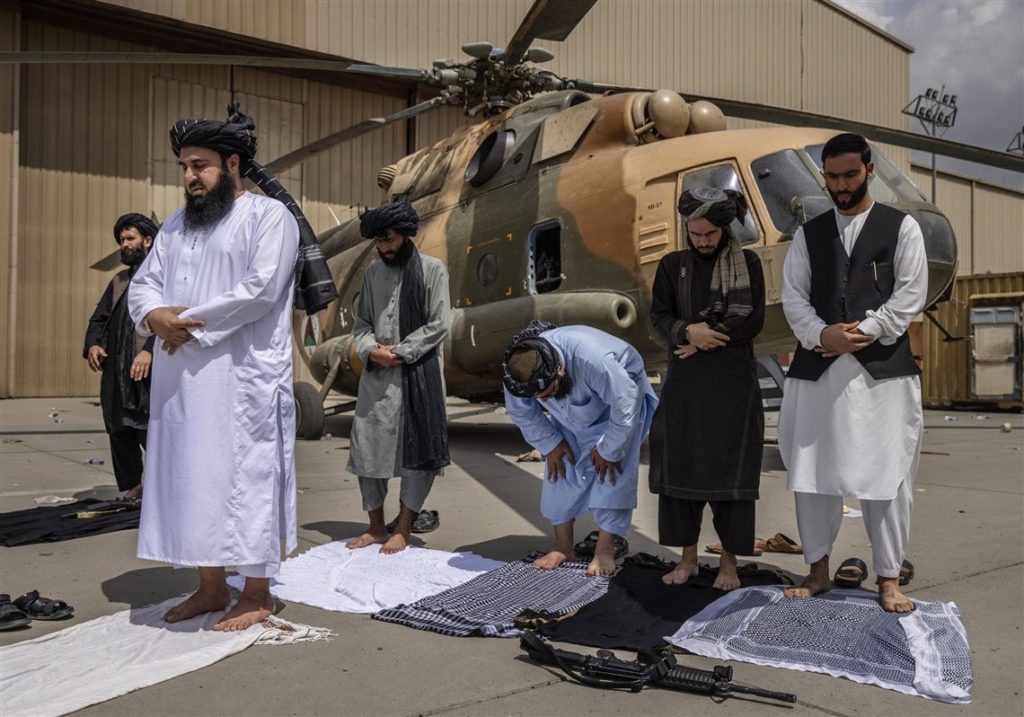9.11事件后江泽民当机立断三选一 中美关系惊人转折
文章来源: 多维
9/11/2021
造成三千多人死亡的“9·11”事件是2001年国际关系中最引人注目的事件,也是美国外交政策的一个转折点。“9·11”事件和中国迅速作出的反应使美国认识到中国不是美国的敌人,恐怖主义才是对美国国家安全的主要威胁,美国需要中国的合作和支持。在当时,以江泽民为核心的中共领导层成功利用“9·11”事件扭转美国遏制中国的态势,增加中美合作的因子,改善中国所处的国际环境,使中国在错综复杂的国际博弈中抓住了宝贵的战略机遇期。
恐怖袭击发生时,另一个半球的中国已经进入夜晚。一些市井街头、高校宿舍、寻常百姓家,突然爆发喝彩,有些人指着电视屏幕喊:“炸得好!”他们将惨剧归结于美国奉行霸权主义的结果,美国是“咎由自取”。
但距第一起恐怖袭击事件发生仅仅五个小时之后,北京时间9月12日凌晨,江泽民就紧急致电美国总统布什(George W.Bush),代表中国政府和人民向美国政府和人民表示深切的慰问,并对死难者家属表示哀悼。江泽民这一举动使中国成为最早向美国表明共同反对国际恐怖主义立场的大国之一,对于后来中美关系的发展有着不可忽视的影响。
中国已故驻法大使吴建民在《外交案例》一书中写道,“9·11”事件发生后,中国政府面临三种选择:第一,静观,不表态;第二,静观各方反应和动向后再表态;第三,以最快的速度谴责恐怖主义。在“9·11”事件发生当晚,通过电视观看事件整个过程的江泽民当即决定召集中央政治局常委开会,中国政府选择了第三种。
9月12日晚,江泽民应约与布什通电话时,再次强烈谴责“这起骇人听闻的恐怖活动”,并表示“我们愿向美方提供一切必要的支援和协助。”同日,中国在联合国安理会投票支持美国提出的反恐决议。根据北京的指示,中国驻联合国代表发言说:“昨天发生的袭击令全世界感到震惊,它虽然发生在美国,却意味着对整个国际社会的公然挑衅。”中国的外交支持明确而坚定,帮助美国在全世界范围内建立一个挫败恐怖主义的联盟。
在恐怖袭击发生后,中国马上派遣32名反恐专家前往美国,前所未有地让美国分享情报,这是中美关系的一个惊人转折。据美国作家库恩(Robert Lawrence Kuhn)撰写的《江泽民传》披露,在随后数月中,当美国开始策划反击时,中国的反恐人员与美国同行定期举行会晤。中国关闭了与阿富汗和盟友巴基斯坦的边境,以防“基地”和塔利班头目经中国逃窜。考虑到中国关于不破坏国家主权以及不干涉他国内政的政策,这些积极举动尤为引人瞩目。另外,中国还允许美国“斯坦尼斯”号航空母舰战斗群在前往阿拉伯海参与反恐战事途中逗留香港。
中国已故驻法大使吴建民在《外交案例》一书中写道,“9·11”事件发生后,中国政府面临三种选择:第一,静观,不表态;第二,静观各方反应和动向后再表态;第三,以最快的速度谴责恐怖主义。在“9·11”事件发生当晚,通过电视观看事件整个过程的江泽民当即决定召集中央政治局常委开会,中国政府选择了第三种。
9月12日晚,江泽民应约与布什通电话时,再次强烈谴责“这起骇人听闻的恐怖活动”,并表示“我们愿向美方提供一切必要的支援和协助。”同日,中国在联合国安理会投票支持美国提出的反恐决议。根据北京的指示,中国驻联合国代表发言说:“昨天发生的袭击令全世界感到震惊,它虽然发生在美国,却意味着对整个国际社会的公然挑衅。”中国的外交支持明确而坚定,帮助美国在全世界范围内建立一个挫败恐怖主义的联盟。
在恐怖袭击发生后,中国马上派遣32名反恐专家前往美国,前所未有地让美国分享情报,这是中美关系的一个惊人转折。据美国作家库恩(Robert Lawrence Kuhn)撰写的《江泽民传》披露,在随后数月中,当美国开始策划反击时,中国的反恐人员与美国同行定期举行会晤。中国关闭了与阿富汗和盟友巴基斯坦的边境,以防“基地”和塔利班头目经中国逃窜。考虑到中国关于不破坏国家主权以及不干涉他国内政的政策,这些积极举动尤为引人瞩目。另外,中国还允许美国“斯坦尼斯”号航空母舰战斗群在前往阿拉伯海参与反恐战事途中逗留香港。
在“9·11”事件发生后仅一年之内,中美元首就进行三次会谈,两国关系趋于稳定。江泽民最后一次访美是一次承先启后的重要访问。两个星期后,中共十六大召开,胡锦涛接班,把稳定的中美关系继续向前推进。
吴建民认为,“9·11”事件发生后中国政府的反应迅速、及时、正确,尤其是两国元首间的电话往来,对于稳定推动中美关系的发展产生积极作用,影响深远。
与在1999年5月美国轰炸中国大使馆和2001年4月中美撞机事件时的愤怒相比,江泽民在“9·11”事件中的“慰问与哀悼”似乎是一个大转弯。对此,库恩认为,江泽民有关使馆被炸、撞机事件和“9·11”事件的选择,都与他对中国的长远整体看法和长期以来形成的对美国的认识相一致。他首先是一名中国的爱国者,相信美中之间的良好关系对21世纪的和平与繁荣是不可或缺的。
Ross Douthat: The American empire in retreat
By ROSS DOUTHAT
9/09/2021

In one of the more arresting videos that circulated after the fall of Kabul, a journalist follows a collection of Taliban fighters into a hangar containing abandoned, disabled U.S. helicopters. Except that the fighters don’t look like our idea of the Taliban: In their gear and guns and helmets (presumably pilfered), they look exactly like the American soldiers their long insurgency defeated.
As someone swiftly pointed out on Twitter, the hangar scene had a strong end-of-the-Roman Empire vibe, with the Taliban fighters standing for the Visigoths or Vandals who adopted bits and pieces of Roman culture even as they overthrew the empire. For a moment, it offered a glimpse of what a world after the American imperium might look like: Not the disappearance of all our pomps and works, any more than Roman culture suddenly disappeared in 476 A.D., but a world of people confusedly playacting American-ness in the ruins of our major exports, the military base and the shopping mall.
But the glimpse provided in the video isn’t necessarily a foretaste of true imperial collapse. In other ways, our failure in Afghanistan more closely resembles Roman failures that took place far from Rome itself — the defeats that Roman generals suffered in the Mesopotamian deserts or the German forests, when the empire’s reach outstripped its grasp.
Or at least that’s how I suspect it will be seen in the cold light of hindsight, when some future Edward Gibbon sets out to tell the story of the American imperium in full.
That cold-eyed view, taken from somewhere centuries hence, might describe three American empires, not just one. First there is the inner empire, the continental USA with its Pacific and Caribbean satellites.
Then there is the outer empire, consisting of the regions that Americans occupied and rebuilt after World War II and placed under our military umbrella: basically, Western Europe and the Pacific Rim.
Finally, there is the American world empire, which exists spiritually wherever our commercial and cultural power reaches, and more practically in our patchwork of client states and military installations. In a way, this third empire is our most remarkable achievement. But its vastness inevitably resists a fuller integration, a more direct kind of American control.
Seen from this perspective, the clearest American defeats of our imperial era, first in Southeast Asia in the 1960s and then in the Middle East and Central Asia after 9/11, have followed from the hubristic idea that we could make the world empire a simple extension of the outer empire, making NATO-style arrangements universal and applying the model of post-World War II Japan and Germany to South Vietnam or Iraq or the Hindu Kush.
We have experienced similar failures, with less bloodshed but more significant strategic consequences, in our recent efforts to Americanize potential rivals.
Our disastrous development efforts in Russia in the 1990s led to a Putinist reaction, not the German- or Japanese-style relationship we had imagined. The unwise “Chimerican” special relationship of the past two decades seems to have only smoothed China’s path to becoming a true rival, not a junior partner in a peaceful world order.
Both kinds of failures and their consequences — Russian revanchism and growing Chinese power combined with quagmire in Iraq and defeat in Afghanistan — have meaningfully weakened the American world empire, and extinguished our post-9/11 fantasy of truly dominating the globe.
But so long as we have the other two empires to fall back on, from our cold-eyed Gibbonian perspective the situation still looks more like a scenario where Rome lost frontier wars to Parthia and Germanic tribes simultaneously — a bad but recoverable situation — than like outright imperial collapse.
That said, defeats on distant frontiers can also have consequences closer to the imperial core. The American imperium can’t be toppled by the Taliban. But in our outer empire, in Western Europe and East Asia, perceived U.S. weakness could accelerate developments that genuinely do threaten the American system as it has existed since 1945 — from German-Russian entente to Japanese rearmament to a Chinese invasion of Taiwan.
Inevitably those developments would affect the inner empire, too, where a sense of accelerating imperial decline would bleed into all our domestic arguments, widen our already yawning ideological divides, encourage the feeling of crackup and looming civil war.
Which is why you can think, as I do, that it’s a good thing that we finally ended our futile engagement in Afghanistan and still fear some of the possible consequences of the weakness and incompetence exposed in that retreat.
And applied to the American empire as a whole, this fear points to a hard truth: You might think that our country would be better off without an imperium entirely, but there are very few paths back from empire, back to just being an ordinary nation, that don’t involve a truly wrenching fall.
Ross Douthat is a columnist for The New York Times.



